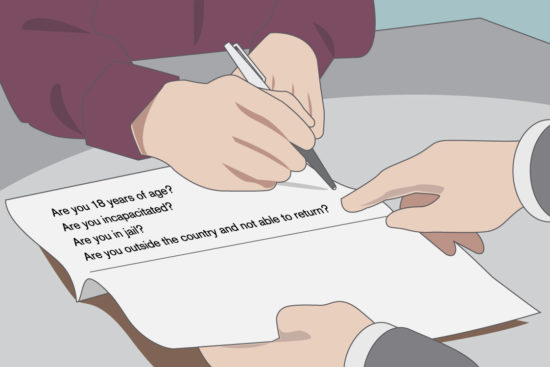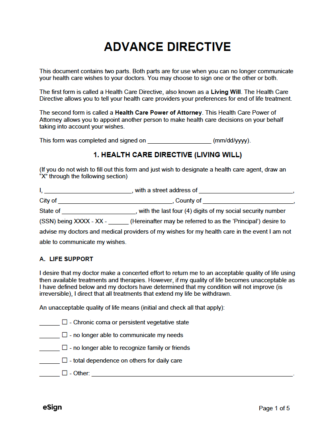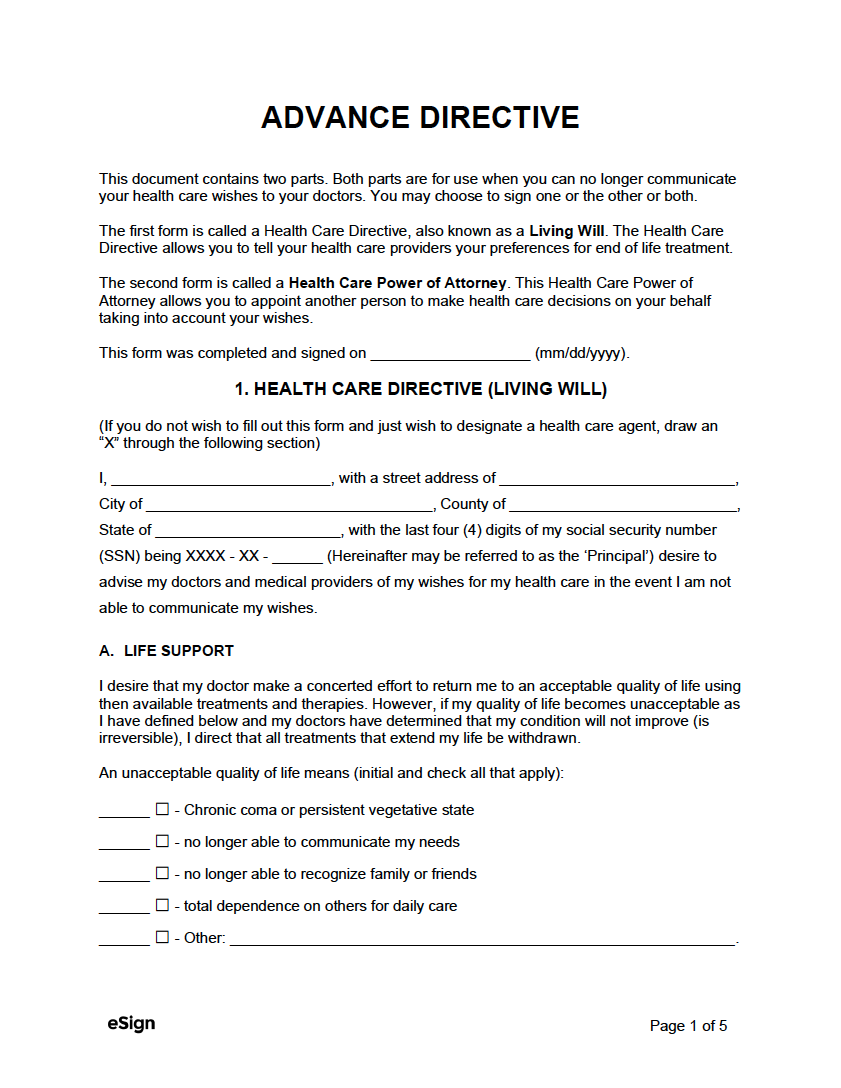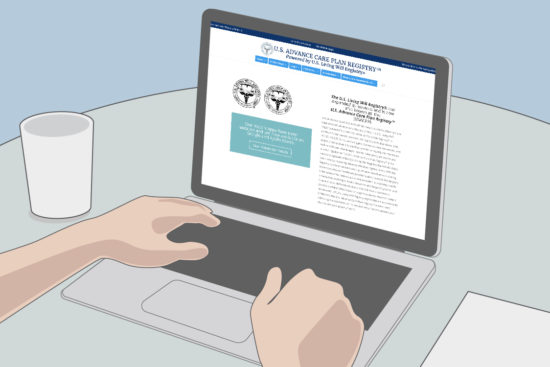Document Features
- Life Support – Enables the principal to establish when life support should be continued or withdrawn (e.g., coma, incapacitation).
- Life-Sustaining Treatments – Describes which treatments the principal does not want to receive under any circumstances (CPR, ventilation, feeding tubes, etc.).
- End-of-Life Wishes – Allows the principal to include other medical wishes such as hospice care, funeral arrangements, and organ donation.
- Health Care Agent – Identifies the representative the principal has chosen to communicate their medical wishes should they become incapacitated.
By State
- Alabama
- Alaska
- Arizona
- Arkansas
- California
- Colorado
- Connecticut
- Delaware
- Florida
- Georgia
- Hawaii
- Idaho
- Illinois
- Indiana
- Iowa
- Kansas
- Kentucky
- Louisiana
- Maine
- Maryland
- Massachusetts
- Michigan
- Minnesota
- Mississippi
- Missouri
- Montana
- Nebraska
- Nevada
- New Hampshire
- New Jersey
- New Mexico
- New York
- North Carolina
- North Dakota
- Ohio
- Oklahoma
- Oregon
- Pennsylvania
- Rhode Island
- South Carolina
- South Dakota
- Tennessee
- Texas
- Utah
- Vermont
- Virginia
- Washington
- West Virginia
- Wisconsin
- Wyoming
Advance Directive: Explained
An advance directive allows patients to make medical decisions in advance in the event that they cannot communicate their wishes (a state referred to as being “incapacitated”). This document is commonly created before someone undergoes surgery or if they start showing signs of the onset of dementia or other mind-altering conditions.
3 Types of Advance Directives
An “advance directive” typically refers to the following documents, either separately or combined:
How to Get an Advance Directive
Step 1 – Qualify

Any person residing in the United States is qualified to create an advance directive, except those who are:
- Under eighteen (18) years of age.
- Incapacitated.
- Incarcerated.
- Outside of the country and not able to return.
Step 2 – Make Medical Decisions
The principal can start filling out the living will section of the directive, choosing whether or not to withhold end-of-life treatment options such as breathing assistance, artificial nutrition and hydration, and prolonged relief from pain.
In addition, the principal can decide where their organs will go after their death (i.e., donation options) and identify their preferred primary care physician.
Step 3 – Choose an Agent
For the medical power of attorney section, the principal will need to select an agent (also known as a “proxy” or “attorney-in-fact”). In most cases, the principal appoints their spouse, a family member, or a trusted friend.
The agent typically has the authority to consent to or refuse medical treatment, withhold life-sustaining measures, transfer the principal to another facility or change physicians, and otherwise make any health care decisions normally reserved for the principal.
Step 4 – Sign the Form
Advance directives must be executed according to the signing requirements of the principal’s state of residence, which often include the signatures of the principal, agent, witnesses, and a notary public.
Step 5 – Distribute Copies
Copies of the advance directive should be sent to the principal’s primary physician, any applicable healthcare agencies, and, most importantly, the principal’s appointed agent.
Step 6 – Registry Filing (Optional)
Some states have a registry where the principal can record the advance directive to add another layer of validation and prevent any complications in the future. There are national registries that may be used, such as the U.S. Advance Care Plan Registry and DocuBank, that also help to ensure the form is safely stored.
Advance Directive: Laws
The following table outlines the signatures required for advance directives to be legally valid in each state.
View State Requirements |
||||
| Alabama | 2+ Witnesses | § 22-8A-4(c)(4) | ||
| Alaska | 2 Witnesses OR Notary | § 13.52.010(b) | ||
| Arizona | 1 Witness OR Notary | § 36-3221(3) | ||
| Arkansas | 2 Witnesses OR Notary | § 20-6-103(c)(1) | ||
| California | 2 Witnesses OR Notary | § 4673(a)(3) | ||
| Colorado | 2 Witnesses OR Notary | § 15-18-106(1) | ||
| Connecticut | 2 Witnesses | § 19a-575a(a) | ||
| Delaware | 2+ Witnesses | § 2503(b)(1)(d) | ||
| Florida | 2 Witnesses | § 765.202(1) | ||
| Georgia | 2 Witnesses | § 31-32-5(c) | ||
| Hawaii | 2 Witnesses OR Notary | § 327E-3 | ||
| Idaho | Principal Only | § 39-4510(b) | ||
| Illinois | 2 Witnesses | 755 ILCS 35/3 | ||
| Indiana | 2 Witnesses OR Notary | § 16-36-4-8(b)(5) | ||
| Iowa | 2 Witnesses OR Notary | § 144A.3(2) | ||
| Kansas | 2 Witnesses OR Notary | § 65-28,103(a) | ||
| Kentucky | 2 Witnesses OR Notary | § 311.625 | ||
| Louisiana | 2 Witnesses | 1151.2(A)(2) | ||
| Maine | 2 Witnesses | § 5-803(2) | ||
| Maryland | 2 Witnesses | § 5–602(c)(1) | ||
| Massachusetts | 2 Witnesses | Ch. 201D § 2 | ||
| Michigan | 2 Witnesses | § 700.5506(4) | ||
| Minnesota | 2 Witnesses OR Notary | § 145C.03(1)(5) | ||
| Mississippi | 2 Witnesses OR Notary | § 41-41-205(2)(a) | ||
| Missouri | Notary/2 Witnesses | §§ 404.705(1)(3), 459.015(4) | ||
| Montana | 2 Witnesses/Notary | §§ 50-9-103(1), 72-31-305 | ||
| Nebraska | 2 Witnesses OR Notary | §§ 20-404(1), 30-3404(5) | ||
| Nevada | 2 Witnesses/Notary | NRS 449A.433(1), 162A.790(2) | ||
| New Hampshire | 2 Witnesses OR Notary | § 137-J:14 | ||
| New Jersey | 2 Witnesses OR Notary | § 26:2H-56 | ||
| New Mexico | 2 Witnesses (Recommended) | § 24-7A-4 | ||
| New York | 2 Witnesses | PBH § 2981(2) | ||
| North Carolina | 2 Witnesses AND Notary | § 90-321(c)(3), (4) | ||
| North Dakota | 2 Witnesses OR Notary | 23-06.5-05(2) | ||
| Ohio | 2 Witnesses OR Notary | §§ 2133.02(B), 1337.12 | ||
| Oklahoma | 2 Witnesses | § 63 3101.4(A) | ||
| Oregon | 2 Witnesses OR Notary | 127.515(2) | ||
| Pennsylvania | 2 Witnesses | §§ 5442(b)(2), 5452(b)(2) | ||
| Rhode Island | 2 Witnesses | §§ 23-4.11-3(a), 23-4.10-2 | ||
| South Carolina | 2 Witnesses AND Notary | § 44-77-40(2), 62-5-503(3) | ||
| South Dakota | 2 Witnesses OR Notary | §§ 59-7-2.1, 34-12D-2 | ||
| Tennessee | 2 Witnesses OR Notary | § 68-11-1803(b) | ||
| Texas | 2 Witnesses OR Notary | § 166.032(b), (b-1) | ||
| Utah | 1 Witness | § 75A-3-303(1)(c) | ||
| Vermont | 2+ Witnesses | § 9703(b) | ||
| Virginia | 2 Witnesses | § 54.1-2983 | ||
| Washington | 2 Witnesses OR Notary | § 70.122.030(1) | ||
| West Virginia | 2+ Witnesses AND Notary | § 16-30-4(a) | ||
| Wisconsin | 2 Witnesses | § 154.03(1) | ||
| Wyoming | 2+ Witnesses OR Notary | § 35-22-403(b) | ||
Sample
Download: PDF (Blank) | PDF (Sample Data)
ADVANCE DIRECTIVE
This form was completed and signed on [MM/DD/YYYY].
1. HEALTH CARE DIRECTIVE (LIVING WILL).
I, [PRINCIPAL NAME], with a street address of [PRINCIPAL STREET], City of [PRINCIPAL CITY], County of [PRINCIPAL COUNTY], State of [PRINCIPAL STATE], with the last four (4) digits of my social security number (SSN) being XXXX – XX – [XXXX] (Hereinafter referred to as the “Principal”) desire to advise my doctors and medical providers of my wishes for my health care in the event I am not able to communicate my wishes.
A. Life Support
I desire that my doctor make a concerted effort to return me to an acceptable quality of life using the available treatments and therapies. However, if my quality of life becomes unacceptable, as I have defined below, and my doctors have determined that my condition will not improve (is irreversible), I direct that all treatments that extend my life be withdrawn.
Unacceptable quality of life means (initial and check all that apply):
[INITIAL] ☐ – Chronic coma or persistent vegetative state
[INITIAL] ☐ – No longer able to communicate my needs
[INITIAL] ☐ – No longer able to recognize family or friends
[INITIAL] ☐ – Total dependence on others for daily care
[INITIAL] ☐ – Other: [OPTIONAL – OTHER UNACCEPTABLE QUALITY OF LIFE].
Initial and check only one:
[INITIAL] ☐ – Even if I have the quality of life described above, I still wish to be treated with food and water by tube or intravenously (IV).
[INITIAL] ☐ – If I have the quality of life described above, I do NOT wish to be treated with food and water by tube or intravenously (IV).
B. Certain Life-Sustaining Treatment
Some people do not wish to have certain life-sustaining treatments under any circumstance, even if recovery is a possibility. Check treatments below, if any, that you do not wish to have under any circumstances:
[INITIAL] ☐ – Cardiopulmonary Resuscitation (CPR)
[INITIAL] ☐ – Ventilation (breathing machine)
[INITIAL] ☐ – Feeding tube
[INITIAL] ☐ – Dialysis
[INITIAL] ☐ – Other: [OTHER UNWANTED TREATMENT (OPTIONAL)].
C. End of Life Wishes (hospice care, funeral arrangements, etc.):
When I am near death, it is important to me that: [WRITE END-OF-LIFE WISHES HERE].
2. MEDICAL POWER OF ATTORNEY.
I, [PRINCIPAL NAME], as Principal, designate [AGENT NAME] as my agent to act in all matters relating to my health care (including my mental health care) and including, without limitation, the power to give or refuse consent to all medical and surgical treatments, hospitalizations, and related health care. This power of attorney is effective at the point when I am no longer able to communicate my health care wishes. My agent’s decisions under this power of attorney, during any period when I am unable to make and/or communicate my health care decisions or when there is uncertainty as to whether I am dead or alive, are binding on my heirs, devisees, and personal representatives.
[INITIAL] – I specifically consent to giving my agent the power to admit me to an inpatient or partial psychiatric hospitalization program if ordered by my physician.
[INITIAL] – This Advance Directive, including Medical Power of Attorney, may not be revoked if I am incapacitated.
My agent’s address and phone number are as follows:
Agent Address: [AGENT ADDRESS]
Agent Phone Number: [AGENT PHONE NUMBER]
If my agent is unwilling or unable to serve, I hereby appoint [SUCCESSOR AGENT NAME] as my successor agent.
My successor agent’s address and phone number are as follows:
Successor Agent Address: [SUCCESSOR AGENT ADDRESS]
Successor Agent Phone Number: [SUCCESSOR AGENT PHONE NUMBER]
I intend for my agent to receive any and all of my health records and information as if I were the one requesting such information.
I have signed this document on [MM/DD/YYYY].
Principal’s Signature: ___________________________
Printed Name: [PRINCIPAL NAME]
Principal Address: [PRINCIPAL ADDRESS]
Principal Phone Number: [PRINCIPAL PHONE NUMBER]
WITNESS ACKNOWLEDGMENT
On the date set forth above, I hereby state as follows:
The above-named person is personally known to me, and I believe them to be of sound mind and to have voluntarily executed this document. I am at least 18 years old, not related to them by blood, marriage, or adoption, and I am not an agent or successor agent named in this document. To my knowledge, I am not a beneficiary of their will or any codicil, and I have no claim against their estate. I am not directly involved in their health care.
Witness 1 Signature: ___________________________
Printed Name: [WITNESS NAME]
Address: [WITNESS ADDRESS]
Phone: [WITNESS PHONE NUMBER]
Witness 2 Signature: ___________________________
Printed Name: [WITNESS NAME]
Address: [WITNESS ADDRESS]
Phone: [WITNESS PHONE NUMBER]
NOTARY ACKNOWLEDGMENT
State of [STATE]
County of [COUNTY]
Signed and sworn to me this [MM/DD/YYYY].
I, the undersigned authority in and for said County in said State, hereby certify that the Principal [PRINCIPAL NAME], whose name is signed above in this living will and who is known to me, acknowledged before me on this day that, being informed of the contents of the said document, (s)he executed the same voluntarily on the day the same date.
Notary Public Signature: ___________________________
Printed Name: [NOTARY NAME]
My commission expires: [EXPIRATION].
(Notary Seal)






